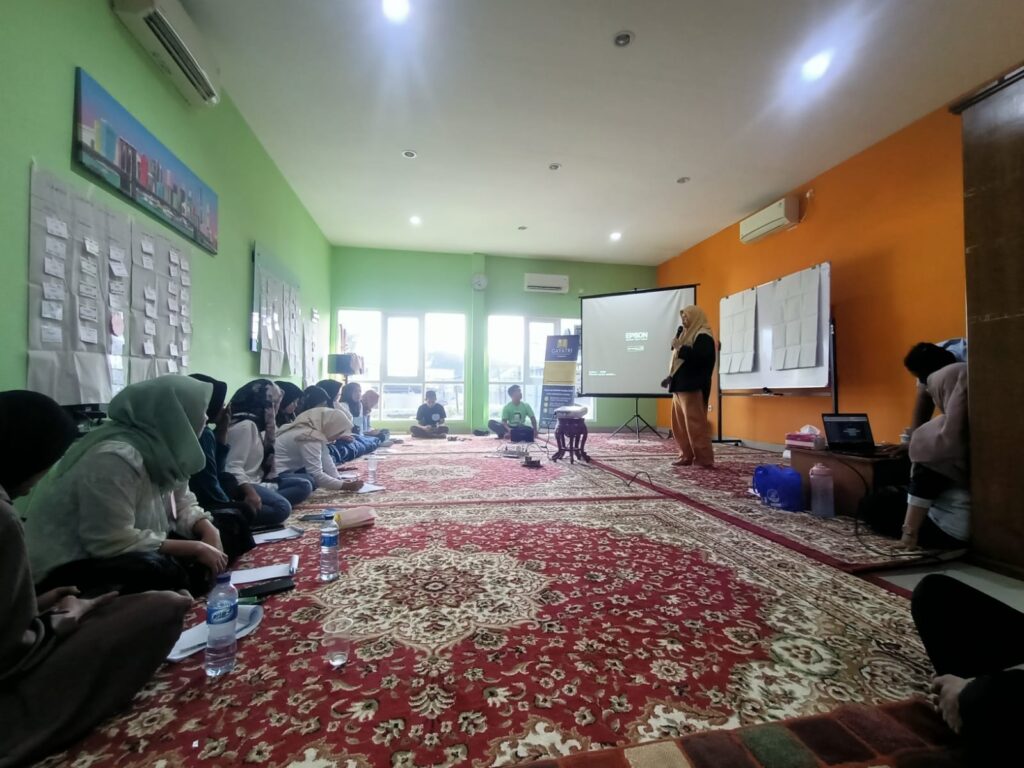The active participation of Kasepuhan women in local economic development has become the main focus of the Estungkara-INKLUSI Program. This involves three Kasepuhan in Lebak, Banten, among others; Kasepuhan Cirompang, Kasepuhan Pasir Eurih, and Kasepuhan Cibarani. They are participants in the Cooperative Training Program which aims to strengthen the role of women in the realm of economic improvement.
This training activity was held on 07-08 May 2024 in Jakarta. This activity is a collaboration between the Jakarta Women's Empowerment and Resource Development Institute (PPSW) through the Estungkara-INKLUSI program supported by Partnerships.
The training was attended by 12 participants who were representatives from each group. Kasepuhan Lodong Cibarani sent 4 participants, Kasepuhan Sompang Sancang-Cirompang was represented by 3 participants, and Kasepuhan Canoli sent 5 participants.
The main aim of this activity is to provide basic cooperative education to women's economic groups in Kasepuhan. Through a series of activities that include learning about the philosophy, concepts and institutions of cooperatives, participants also have the opportunity to engage in dialogue and visit directly one of the cooperatives that is already running.
On the first day, participants received capacity building from Mrs. Tri Endang Sulistiyowati from PPSW Jakarta who has long been active in assisting several cooperatives in Jakarta. Mrs. Tri opened the session by conveying the philosophy of cooperatives, emphasizing the importance of working in groups and why cooperatives are an option.
He explained several basic principles in building cooperatives, namely that they must be collective, be a tool for economic democratization, and emphasize self-reliance and sustainability. The choice of cooperatives as a management model is considered relevant to the strong values of mutual cooperation and family in the Kasepuhan community. So it is hoped that participants can apply cooperative concepts in developing their businesses effectively and sustainably.
The second material on the first day was strengthening group management which was also conveyed by Mrs. Tri. In this session, participants learn about the responsibilities of group members and administrators. Including the process of joint decision making and the preparation of group regulations. Participants are invited to understand their respective responsibilities, from chairman, secretary, treasurer to members, as well as the principles in the group decision-making process.
On the second day, Mrs. Tri again gave material, this time about strengthening leadership. Participants are taught what a leader is, leadership styles, and types of group members. Mrs. Tri explained that a leader is a person who leads a group of two or more people. Meanwhile, leadership is the process of influencing other people through directed communication to achieve goals.
Participants are taught to recognize four types of members: unwilling and unable, willing but unable, unwilling but able, and willing and able. The leadership styles taught include commanding, inviting, involving and delegating tasks, which are adjusted to the type of member.
The final material in this comparative study is a more detailed explanation of cooperatives. Mrs. Tri explained the history, principles, values and rules of the cooperative. After this material, participants were invited to visit the Lentera Benteng Jaya Cooperative in Tangerang, a cooperative supported by PPSW whose members are women from the Benteng Chinese community.
Mrs. Tyas Widya Anggraini, chairman of the cooperative, shared her story about the changes in her life after joining the cooperative accompanied by PPSW. In the past, Mrs. Tyas often gambled and experienced economic difficulties, but now the cooperative she leads has grown to 800 members.
This initiative is not just a step towards economic equality, but also an investment in local economic sovereignty. By providing greater opportunities and support for women in economic development, it is hoped that a positive transformation will occur that will have a long-term impact on the welfare of society, especially indigenous communities in Kasepuhan.
RMI is collaborating with PPSW which is bridged by Partnership through the Estungkara program to collaborate in women's economic empowerment through the cooperative concept. This collaboration, which began in 2023, is considered very relevant to RMI's efforts to encourage the economic independence of women's groups in the Kasepuhan community. In the future, this collaboration will continue to strengthen economic empowerment in the Kasepuhan community.


